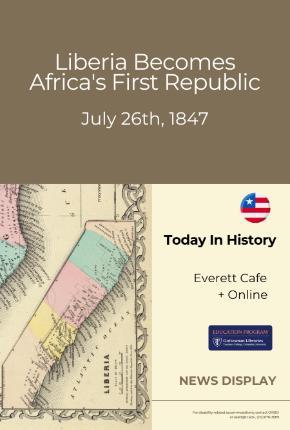Today in History: Liberia Becomes Africa's First Republic

I recalled the pictures I once saw of those first settlers in Monrovia from America, who wore top hats and three-piece suits during the dry season, on days that could not have been less than ninety degrees. But they had made it to a land, made it back home to the continent, free now with a country all their own. And they built the houses and the farms and the government, built the churches and the schools and the clinics, and they bought the clothes like the men their fathers and grandfathers had criticized. They say the master's tools can never dismantle the master's house. And alas, those at the soundless core of Liberia, then as well as now, tired of attempting to overthrow their rulers, use their master's tools to build houses of their own. To build cities of their own. And how? How does one model a nonpareil freedom from the master's tools, the same used to mold the institutions that kept them in chains? Pyrrhic victories.
-- Wayétu Moore (Teachers College alumna), The Dragons, the Giant, the Women: A Memoir, Ch. 17, p. 158.
On July 26th, 1847 Liberia, a country on the Western coast of Africa, declared its independence, becoming Africa's first and oldest modern republic. Under the direction and influence of the American Colonization Society (ACS), Liberia had been a refuge for free blacks and liberated American slaves from 1822 through the American Civil War, 1861-1865. However, it was not until 1862, fifteen years after Liberia declared its independence, that the United States established diplomatic relations and recognized Liberia as a republic.
American-Liberian settlers and indigenous peoples whose history dated back hundreds of thousands of years found new political conflict, disagreements over land, and warfare. Over the years, two civil wars would occur, the first from 1989-1997, the result of a military coup that led to the overthrow Samuel Doe, Liberia's first indigenous leader, and the second, from 1998-2003, with the overthrow of rebel leader and president Charles Taylor. War took its toll on the population, economy, and social structure -- causing 250,000 deaths; significant displacements; high poverty rates; low literacy rates; and many other issues and concerns. Peace Corps volunteers, including TC's own Rocky Schwartz, have served the people of Liberia since the program was first launched in 1962, despite interruptions in service due to civil war.
The following articles are drawn from Proquest Historical Newspapers, which informs and inspires classroom teaching and learning.
- Liberia Is Festive on 90th Birthday: Republic Formed to Provide a Home for Free Slaves Marks Anniversary. (1937, Jul 27). New York Times (1923-)
- Liberia Gets 91-Year Old Flag from U.S.: Gift from the Stokes Fund Is Presented. (1938, Dec 31).The Chicago Defender (National Edition) (1921-1967)
- Liberia, African Republic, Has Been Independent Since 1847: Government Modeled After That of the U.S. (1943, ). The Call (1933-)
- Whittemore, M. (1947, Jan 07). National Anthems of U.N. Liberia--16: Liberia's Anthem. The Christian Science Monitor (1908-)
- Whole World Lauds Liberia's Progress: Republic Makes Big Advancement. (1947, Aug 16). New York Amsterdam News (1943-1961)
- WWedeck, H.E. (1947, Dec 28). Genesis of a Model Republic: Liberia. New York Times (1923-)
- Richburg, K. (1992, Nov 15). Liberia's Surreal Civil War: The Sequel: Fighting, Atrocities Return After Lull--With a Vengeance. The Washington Post (1974-)
- UN Airlifts Liberia Kids to Safe Area: Escalating Civil War Threatens Thousands. (1994, Oct 25). Chicago Tribune (1963-1996)
- Buckley, S. (1995, Sep 10). Liberia Tries Peace After 5-Year Civil War: Interim Government Finds Little to Build on Following False Settlements, Devastation. The Washington Post (1974-)
- Monrovia. (1997, Jul 22). Man Who Launched Liberian Civil War Moves Closer to Presidency. The Irish Times (1921-)
- Clark, M. (2006, Nov 16). Entering Liberia's National Park: War-Torn Liberia Is Ready for Tourists to Visit Its Rain Forest -- But Are Tourists Ready for This Uncut Germ? The Christian Science Monitor (1908-)
- Gyarkue, L. (2018, Sep 24). Liberia Is Reborn in a Debut Novel: Wayetu Moore Reframes History in Magical Terms. New York Times (1923-)?

Tips:
- Barnes, Kenneth C. Journey of Hope : The Back-to-Africa Movement in Arkansas in the Late 1800’s. 1st ed. Chapel Hill: University of North Carolina Press, 2004. e-book
- Dunn, D. Elwood, Amos Jones Beyan, and Carl Patrick Burrowes. Historical Dictionary of Liberia. 2nd ed. Lanham, Md: Scarecrow Press, 2001. e-book.
- Gallagher, Catherine. Teacher Training for Rural Education, An Assessment from a Case Study in Liberia. Student Paper for Class TZ 4000. New York: Teachers College, Columbia University, 1979. Teachers College Digital Collections.
- History of Liberia: A Time Line, Library of Congress.
- Innes, William. Liberia; Or, the Early History & Signal Preservation of the American Colony of Free Negroes on the Coast of Africa. Edinburgh: Waugh and Innes, 1833. e-book.
- Johnson, Edward. A School History of the Negro Race in America from 1619 to 1890, Combined with the History of the Negro Soldiers in the Spanish-American War; Also a Short Sketch of Liberia. New York (State): AMS Press, 1969. e-book.
- Moore, Wayétu. The Dragons, the Giant, the Women: A Memoir. Minneapolis: Graywolf Press, 2020. Stacks ; DT636.53.M66 A3 2020.
- Moore, Wayétu. She Would Be King : A Novel. Minneapolis, Minnesota: Graywolf Press, 2018. Stacks ; PS3613.O5686 S44 2018.
- Moran, Mary H. Liberia : The Violence of Democracy. 1st ed. Philadelphia, Pa: University of Pennsylvania Press, 2006. e-book.
Images:
- Schomburg Center for Research in Black Culture, Jean Blackwell Hutson Research and Reference Division, The New York Public Library. (1850). Map of Africa From the Latest Authorities. Courtesy of New York Public Library.
- Poster Image: Map of Liberian Republic, 1856. Courtesy of Wikimedia.
Need to keep current, look to the past, teach a topic? The Everett Cafe features daily postings of news from around the world, and also promotes awareness of historical events from an educational context. Be sure to check additional Cafe News postings on the library blog.

